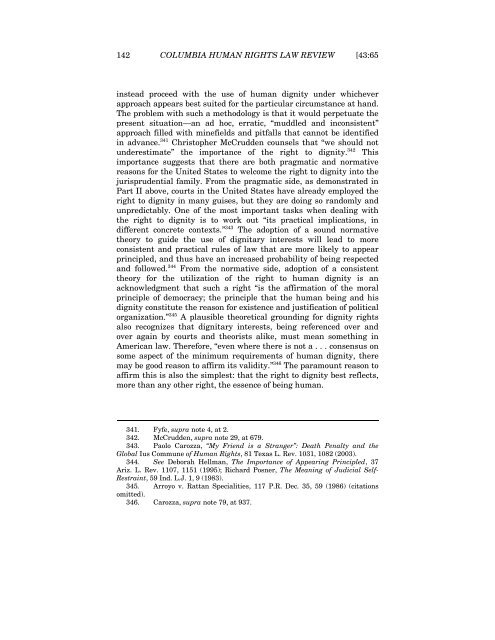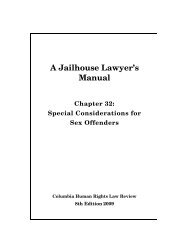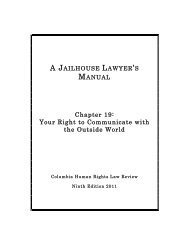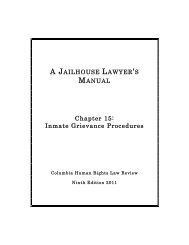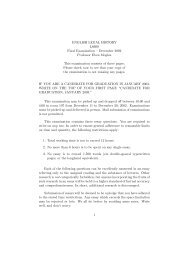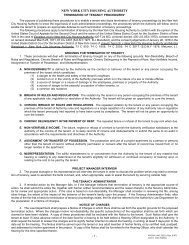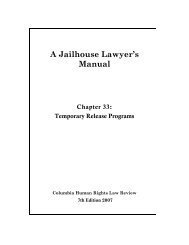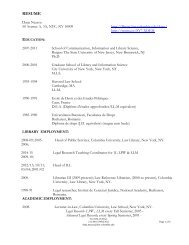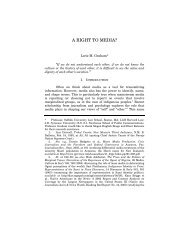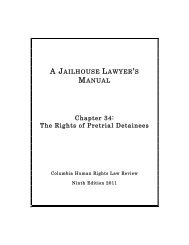The Right to Dignity Rex D. Glensy - Columbia Law School
The Right to Dignity Rex D. Glensy - Columbia Law School
The Right to Dignity Rex D. Glensy - Columbia Law School
You also want an ePaper? Increase the reach of your titles
YUMPU automatically turns print PDFs into web optimized ePapers that Google loves.
142 COLUMBIA HUMAN RIGHTS LAW REVIEW [43:65<br />
instead proceed with the use of human dignity under whichever<br />
approach appears best suited for the particular circumstance at hand.<br />
<strong>The</strong> problem with such a methodology is that it would perpetuate the<br />
present situation—an ad hoc, erratic, “muddled and inconsistent”<br />
approach filled with minefields and pitfalls that cannot be identified<br />
in advance. 341 Chris<strong>to</strong>pher McCrudden counsels that “we should not<br />
underestimate” the importance of the right <strong>to</strong> dignity. 342 This<br />
importance suggests that there are both pragmatic and normative<br />
reasons for the United States <strong>to</strong> welcome the right <strong>to</strong> dignity in<strong>to</strong> the<br />
jurisprudential family. From the pragmatic side, as demonstrated in<br />
Part II above, courts in the United States have already employed the<br />
right <strong>to</strong> dignity in many guises, but they are doing so randomly and<br />
unpredictably. One of the most important tasks when dealing with<br />
the right <strong>to</strong> dignity is <strong>to</strong> work out “its practical implications, in<br />
different concrete contexts.” 343 <strong>The</strong> adoption of a sound normative<br />
theory <strong>to</strong> guide the use of dignitary interests will lead <strong>to</strong> more<br />
consistent and practical rules of law that are more likely <strong>to</strong> appear<br />
principled, and thus have an increased probability of being respected<br />
and followed. 344 From the normative side, adoption of a consistent<br />
theory for the utilization of the right <strong>to</strong> human dignity is an<br />
acknowledgment that such a right “is the affirmation of the moral<br />
principle of democracy; the principle that the human being and his<br />
dignity constitute the reason for existence and justification of political<br />
organization.” 345 A plausible theoretical grounding for dignity rights<br />
also recognizes that dignitary interests, being referenced over and<br />
over again by courts and theorists alike, must mean something in<br />
American law. <strong>The</strong>refore, “even where there is not a . . . consensus on<br />
some aspect of the minimum requirements of human dignity, there<br />
may be good reason <strong>to</strong> affirm its validity.” 346 <strong>The</strong> paramount reason <strong>to</strong><br />
affirm this is also the simplest: that the right <strong>to</strong> dignity best reflects,<br />
more than any other right, the essence of being human.<br />
341. Fyfe, supra note 4, at 2.<br />
342. McCrudden, supra note 29, at 679.<br />
343. Paolo Carozza, “My Friend is a Stranger”: Death Penalty and the<br />
Global Ius Commune of Human <strong>Right</strong>s, 81 Texas L. Rev. 1031, 1082 (2003).<br />
344. See Deborah Hellman, <strong>The</strong> Importance of Appearing Principled, 37<br />
Ariz. L. Rev. 1107, 1151 (1995); Richard Posner, <strong>The</strong> Meaning of Judicial Self<br />
Restraint, 59 Ind. L.J. 1, 9 (1983).<br />
345. Arroyo v. Rattan Specialities, 117 P.R. Dec. 35, 59 (1986) (citations<br />
omitted).<br />
346. Carozza, supra note 79, at 937.


